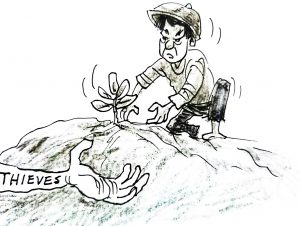We have been told, time and again, about the benefits of growing fruits, vegetables, cereals, and other eatables for personal sustenance, economic growth, and food security. Despite these well-meaning efforts, many people remain reluctant to engage in agricultural activities due, partly, to the rampant problem of theft, which has turned what should be a rewarding endeavor into a source of frustration and disillusionment.
Theft in agricultural communities is more than just an inconvenience; it directly attacks the livelihoods of those who labor to cultivate the land. Farmers invest money, time, and physical effort in planting and nurturing their crops. Yet, when harvest season arrives, many find that the fruits of their labor have been stolen by individuals who contributed nothing to the process. This injustice discourages people from planting in the first place, as the risk of losing everything to thieves is too great. Why should anyone continue to toil under the sun when others are just waiting in the shadows to reap the rewards?
This problem is particularly acute in areas where law enforcement is either ineffective or indifferent. When people feel that their hard work is not protected and that there are no consequences for those who steal, the entire incentive structure for agricultural productivity collapses. This creates a vicious cycle: fewer people plant, leading to less local food production, which in turn makes communities more reliant on external food sources, driving up costs and increasing food insecurity.
Moreover, the social implications of this theft are tremendous. Trust within communities erodes as people become suspicious of their neighbors, wondering who among them might be responsible for the thefts. This breakdown in social cohesion further discourages collaborative efforts that could otherwise strengthen agricultural output, such as community farming initiatives or cooperative storage facilities. The fear of theft not only undermines individual efforts, it also weakens the potential for collective action.
Strengthening law enforcement and ensuring that agricultural theft is treated with the seriousness it deserves is crucial. Communities should establish local watch groups or other forms of collective security. There must be renewed efforts to educate people on the long-term benefits of agricultural productivity, coupled with assurances that their investments will be protected. This would encourage people to contribute to the food security and economic stability of their communities.




